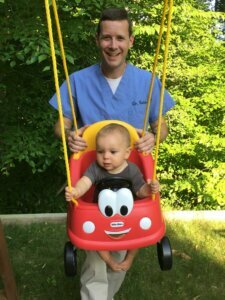Concern about catching, spreading or bringing the new coronavirus home is constant for some front-line medical workers in the D.C. area.
Some are scared to hug their own children.
“This morning, when I came home from work, my 4-year-old son jumped out of bed and ran over to me to give me a big hug — I had to back away from him,” said D.C.-area emergency medicine physician Jared Goldberg.
“Even though I had already changed my clothes at work, I was still worried that I might be carrying some virus particles on me — and could not risk possibly infecting him. So, I told him I had to go shower first and I would give him a hug after that.”
The daily reality of Goldberg’s work also has shifted in a particularly stressful and eerie way.

“The nature of emergency medicine is that we don’t know what is coming through that front door or on the ambulance at any given time,” Goldberg said — while noting that hospital workers know what they’re dealing with if someone comes in with a gunshot wound.
Now, every patient presents a potential worst-case scenario outcome for themselves and their doctors.
“We are acting as though everybody potentially has the virus,” Goldberg said. “We are very fearful of becoming sick ourselves with this virus.”
The general practice of health care workers washing their hands before and after visiting individual patients has escalated into a you-can-never-be-too-careful way.
“Now, I’m probably washing my hands every five minutes,” Goldberg said, noting that every time he needs to scratch an itch or otherwise touch his body, he sanitizes his hands.
Front-line medical workers carry all those concerns around with them daily even as the uncertainty of what lies ahead looms.
“We push forward,” Goldberg said. “We have protocols in place to make sure we’re wearing the most effective protective equipment that is available to us in order to keep ourselves safe. And then, we go about our business of taking care of the patients who so desperately need our help.”








